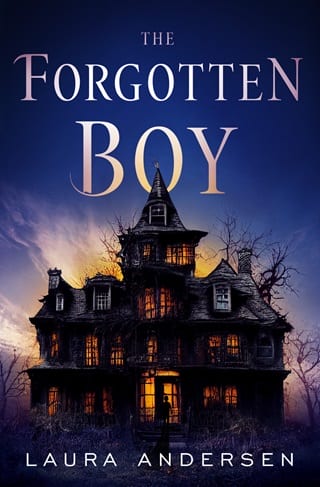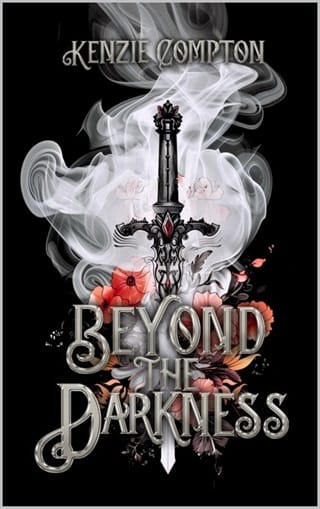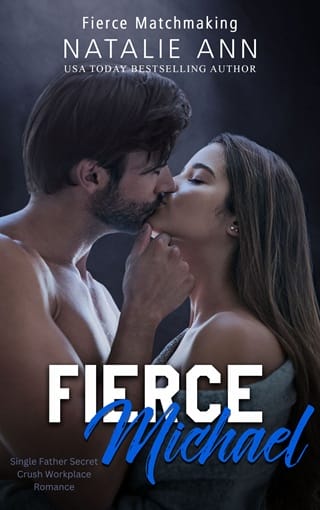Chapter Twenty
CHAPTER TWENTY
DIANA NOVEMBER 1918
Joshua tried to convince Diana that she could just go to tea in her trousers and a sweater.
She laughed. "I have manners."
"We'll be walking across fields to get to the farmhouse," he reminded her.
"I can walk in a skirt."
She proved it with a wide-gored skirt in a heathered green tweed and her long-line wool coat in navy blue over a lace-trimmed blouse. One of the older boys playing cricket on the grounds whistled and Joshua shouted, "Decorum, please. We do not treat women like dogs."
"So you don't think I look nice?" she teased.
Joshua offered her his hand and, after a moment's debate, Diana took it. When was the last time she'd held hands with a man? Long enough that it hadn't been a man, that's for sure, but a boy. She felt some of that girlish thrill now, deepened by her awareness of Joshua's very masculine presence.
"I think," he said deliberately, "that I cannot properly express my appreciation for how you look. It would set a very bad example in front of these schoolboys, because I don't feel at all like being decorous."
Could he feel the flutterings of her pulse through her hand? Thankfully, Joshua knew how to compliment a woman without expecting anything in return. But she didn't let go of his hand until White Rose Farm was in sight.
"Welcome to my home," Joshua said. "Its roots don't go as far back as Havencross, only to 1699. However, it has been in the same family for all of its two hundred and nineteen years, so that's something."
It wasn't as imposing as Havencross either, which filled Diana with relief. White Rose Farm was low-roofed, with two stories in the center and one-story wings balancing it on either side. The dark slate roof paired well with the pale stucco of the outer walls. The front door was painted yellow and vines framed the door and its flanking windows.
"Climbing roses," Diana identified. "White, I presume."
"But of course."
"This farmhouse didn't exist until more than two hundred years after Richard the Third's death. So how did a family with a Scottish surname come late to the Yorkist cause?"
"There were Yorkists in Scotland," Joshua pointed out. "Before he became king, Richard was warden of the North and a particularly respected one at that. By both sides. My granddad always claimed the Murrays bought this land because of an old connection to the Yorkist cause."
"Is there any part of the North that doesn't have connections and causes and claims to the past? My mother would say it's because none of you know how to live in the modern world."
She expected Joshua to laugh. When he didn't, it sharpened her attention.
"London has just as much history weighing on it as the North," he retorted. "Londoners simply build on top of it and pretend it isn't there."
Diana didn't have to think up a reply, because the cheery front door had opened to disclose, in rapid succession, a dog, three cats, a pleasant-looking woman of middle age, who must be Joshua's mother, an adolescent girl, who would be his fifteen-year-old sister, Alice, and a small hurricane who threw himself headlong against Joshua's weak leg so that he had to firmly brace himself on the good one.
"Be careful, Tom!" Alice scolded. "You'll knock Uncle Joshua to the ground."
Tom turned out to be the four-year-old son of Joshua's older sister. She had been widowed by the Somme and now worked in a factory in York while her son stayed at the farm. Looking at the little boy's grin was to get a glimpse of Joshua as a child.
A glimpse of what Joshua's own child might be …
Definitely not following that train of thought , Diana told herself firmly.
The Murray family was as welcoming as Joshua, though in slightly different ways. Alice seemed very grown-up for fifteen—at least compared to Diana, who thought guiltily of things like stealing her brother's motorcycle and sneaking cigarettes at Alice's age—but she brought the same attentive questions as her brother and seemed genuinely curious about Diana's life during the war. Edith Murray was the same age as Diana's mother, and her quietness was in no way shyness. Having seen too many of the fussy, neurotic mothers who fluttered around their wounded sons as though they were broken birds, Diana approved of Edith's steadiness and ability to allow her children to live their lives.
Joshua's grandfather was a hearty, energetic northern farmer of seventy-two. Moving with an ease his grandson no longer possessed, he probably looked the same since he was forty. And though Joshua's father could only greet her from the low daybed in the parlor, he had the same open, welcoming face. He was still recovering from a stroke, but to Diana's professional eye he looked to be healing well.
It had been a long time since Diana had shared a family meal that didn't include arguments, debates, and criticism. Her mother would have thought the Murrays hopelessly uncultured (although she would never have been so rude as to say so directly). The food was also amazing—the benefit of being on a farm, she supposed. When Diana expressed appreciation for the bread, Alice—who had made it—blushed with pleasure and immediately offered to teach her how to bake.
Caught by surprise, Diana said, "I don't know that I'd be any good at baking. What if I forget the salt or burned something?"
"You literally saved my life," Joshua said, "and you're afraid of burning bread?"
"Don't be so dramatic," she shot back. "I spent thirty minutes getting you prepped for surgery, that's all. It's the surgeons and the rehabilitative staff that got you back on your feet."
He looked at her intently, as though they were completely alone—like he had on the moor, and in Clarissa's bedroom this morning. "There's more than one way to save a life. Your work's not done yet, Nurse Neville."
With the exquisite judgment of a mother who knows how to defuse potential emotional explosions, Edith Murray said, "Joshua tells us you are interested in the history of Havencross, Miss Neville. Whatever questions you have, I know my father-in-law will be delighted to answer."
"Please call me Diana," she reminded. "And I don't want to be pushy. But Northumberland and Havencross are so different from anything I've known. I'm dreadfully curious."
"Hear that?" Joshua's grandfather asked the table at large. "Finally, an intelligent woman for me to talk to. Don't worry about being pushy, Diana. You're more likely to beg me to stop talking long after I've exhausted your curiosity."
She wasn't pushy, and he could talk a lot. But luckily for her he was a born storyteller and luckily for him Diana was delighted to have found an absorbing interest far removed from the battlefields of France.
Not that the stories didn't have plenty of violence. "It's the borders," Mr. Murray said easily. "There's always someone to fight. Even as far back as the thirteenth century there were lots of raids. Christian or not, priories were wealthy places and fair game for soldiers and reivers alike. The monks quickly learned to protect their wealth and their people. In Ireland they built round towers as far back as the Viking age to which they could retreat. Havencross did the opposite—they tunneled."
Of course they did , Diana thought. "Escape tunnels?"
"They were more places of retreat than of escape," he conceded. "Whatever outlets they might have had are lost to time. At least so far as archaeologists have learned. Which isn't much since the Somersby family put up that house. They prefer to keep their land private. But I've got drawings from the survey done before building that identify a number of foundations from the original priory. Including the chapel. And there was a dig conducted fifty years ago a few miles from here that seems to have been an exit point to an old tunnel. The police went looking for it when young Thomas went missing."
"They thought he'd gone into a tunnel?"
He shrugged, the wearied sadness on his face a reminder of his age and the death he'd seen on both large and small scales. "He went somewhere. Just nowhere any of us could follow."
It was a curious word, that— follow . Diana would have expected a more prosaic finish, like "nowhere any of us could find." Follow implied Thomas Somersby had stepped through some sort of unnatural or otherworldly veil, crossing a threshold that mere mortals could not.
Passing straight from boy to ghost with no steps in-between.
Diana shivered as she thought of Austin Willis and his brother and the dozens of other boys now at Havencross. Whatever was at work there was disturbing them, and she wouldn't let it go further.
The return walk to Havencross was quiet for the most part, Diana thinking about tunnels and choking and Joshua lost in his own world. When they parted on the upper landing, with the house settled into the end-of-weekend hush around them, he held her hand as he thanked her for coming with him.
He kept holding it when he'd finished speaking, long enough for the same alive awareness that had descended in Clarissa's bedroom to return.
In another moment , Diana thought, I will kiss him .
He kissed her first. A gentle, almost-brotherly kiss on the cheek. But there was nothing sisterly in her reaction to the bristly roughness of his jaw or her sudden wish to lead him to her secluded corridor and bedroom.
They parted without speaking again, and Diana fell asleep with a hand to the cheek he'd kissed.
She woke, as she'd too often done these last weeks, to a burst of freezing air as her covers were yanked off the bed. Diana almost made a grab for the quilt but a realization that it would not be wise to engage in a tug-of-war with something she couldn't see stopped her.
When she tried to turn on the bedside lamp it too was yanked from her grasp. I must have knocked it over , Diana thought as it crashed to the floor. But she knew better. She knew. There was someone in her room. Someone who wanted her gone. Someone who hated her. Someone who had dragged their fingernails across her neck, drawing blood.
Someone who could not be seen.
Not that Diana could see much of anything. But even the shadowy outlines of her room began to fade, as though a vortex were coming from the outside in, sucking away all light and heat. And she knew what came next, the terrible choking on dust and darkness to the point where she couldn't breathe and she would never be able to breathe again or see or move—
Someone pounded on her door with an urgency that spoke of danger. "Diana!"
In an instant, it vanished. The terror, the cold, the dark.
Diana realized she was sitting bolt upright on her bed, hands at her throat as though clawing for air, but whatever presence had been with her was gone. Her covers were still on the floor along with the broken lamp, but Joshua's voice had banished the rest.
She slid carefully to her feet, avoiding the shards of glass, and threw open the door. Joshua stood there in flannel trousers and a partly buttoned shirt. He looked as though he too had been dragged out of bed.
"What's wrong?" she demanded, pushing past him for the infirmary and her bag, with all her years of practice at switching instantly from sleep to work.
"Jasper Willis has disappeared."
 Fullepub
Fullepub 



